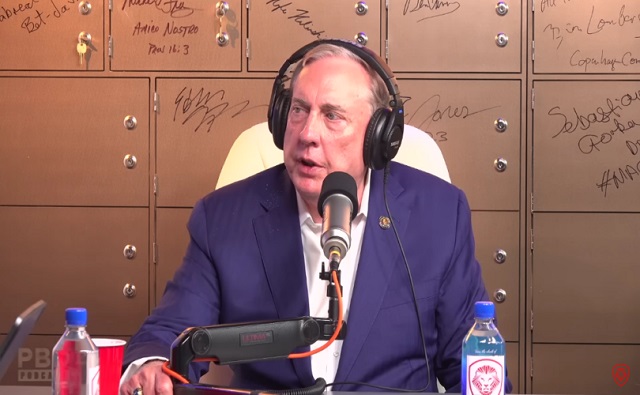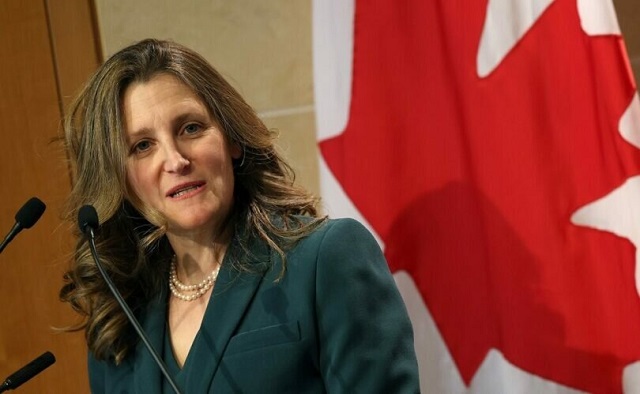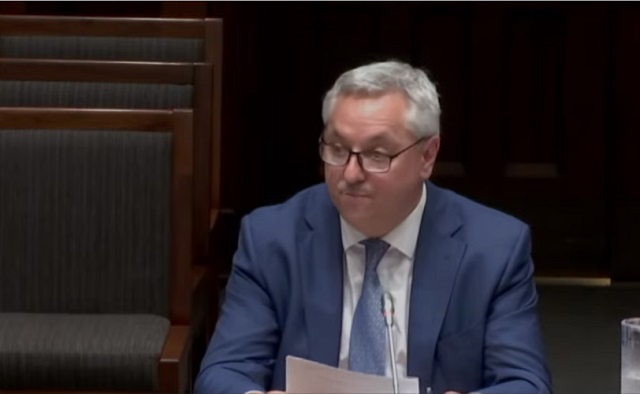Alberta
Standing for Alberta – The Fight for a Fair Deal Within Canada

A new organization called Fairness Alberta has recently joined the ongoing national conversation discussing Alberta’s role in the Canadian landscape as a major contributor to the wealth and general prosperity of the country. Arguments surrounding the value of Alberta, which position it as Canada’s neglected province, have long been a contentious topic at the regional and national levels.
In 2016, Conservative MP Michelle Rempel famously made waves at parliament when she accused the federal government of treating Alberta like a “fart in the room, that no one wants to acknowledge or talk about” (1).
In October 2019, the results of the Canadian Federal Election saw the outrage of many across western Canada, giving rise to the popular Western Exit, better known as WEXIT, movement. Based on fundamental principles of economic liberty and social stability, WEXIT advocates for Western Canadian sovereignty through the secession of the western provinces from the rest of the country.
In January 2020, Alberta Proud hosted The Value of Alberta: A One-Day Conference on Alberta’s Future, featuring keynote topics such as “The Economic Value of Alberta”, “Is there a Canadian Manifesto without Alberta?” and “Reasons Alberta Struggles to fit and Where we go Next”.
On Monday, May 25, Fairness Alberta joined the ranks of Albertans dissatisfied with the federal government’s treatment of Alberta, seeking to take a stand against biased policies and regulations. This Proudly Canadian, Fiercely Albertan organization operates on non-partisan, factual fundamentals, seeking not to deepen the divide between Alberta and the rest of the country, but to bridge the gap through education, discussion and understanding.

Bill Bewick, Executive Director Fairness Alberta, brings extensive experience to the organization with a PhD in Political Science from Michigan State University and years spent working as a political consultant, as well as within the Alberta legislature. “It is entirely outside of our mandate to speculate about separatism,” says Bewick of the WEXIT movement, “our goal is to get a better deal for Alberta, within Canada.”
At the core of their organization, Fairness Alberta believes Canadians should recognize how a prosperous Alberta benefits Canada as a whole. According to Bewick, FA founders and members share a fundamental frustration regarding “how little people and politicians seem to understand about the amount of money leaving Alberta every year.” The Alberta Transfer Meter, operated by Fairness Alberta, features a running total of Alberta’s net contributions to other provinces in the form of federal taxes and EI premiums over the last two decades. According to the Meter, Albertans have seen an estimated total of $324 billion of their tax dollars spent in other Canadian provinces from the year 2000 to 2019.
Dedicated to informing the rest of the country about “the importance of Alberta’s contributions to Canada, and about the unfair nature of various federal policies, actions, and decisions from Ottawa”, Fairness Alberta hopes to help level the Canadian playing field in regards to fiscal, trade, energy, procurement and infrastructure issues.
“Alberta’s contributions are taken for granted,” says Bewick, “We want to encourage investment in a place that has shown high levels of productivity in the past and has a lot of potential for the future.” In achieving this goal, Bewick adds, “we really think education and open discussion are critical in reaching a common ground and having any significant change take place.”
Since their official launch, Fairness Alberta has experienced positive pick-up and feedback from the Alberta public, and is committed to continued growth and expansion throughout the rest of Canada. Dialogue based and donation driven, Bewick encourages the public to reach out, share feedback and join the conversation surrounding Alberta’s future.
For more information on Fairness Alberta and how to get involved, visit https://www.fairnessalberta.ca.
For more stories, visit Todayville Calgary.
Alberta
Red Deer Doctor critical of Alberta’s COVID response to submit report to Danielle Smith this May

From LifeSiteNews
Leading the task force is Dr. Gary Davidson, who was skeptical of mandates at the time.
Alberta Premier Danielle Smith will soon be receiving a little-known report she commissioned which tasked an Alberta doctor who was critical of the previous administration’s handling of COVID to look into how accurate the province’s COVID data collection was, as well as the previous administration’s decision-making process and effectiveness.
As noted in a recent Globe and Mail report, records it obtained show that just less than one month after becoming Premier of Alberta in November of 2022, Smith tasked then-health minister Jason Copping to create the COVID data task force.
Documents show that the Alberta government under Smith gave the new task force, led by Dr. Gary Davidson – who used to work as an emergency doctor in Red Deer, Alberta – a sweeping mandate to look at whether the “right data” was obtained during COVID as well as to assess the “integrity, validity, reliability and quality of the data/information used to inform pandemic decisions” by members of Alberta Health Services (AHS).
As reported by LifeSiteNews in 2021, Davidson said during the height of COVID that the hospital capacity crisis in his province was “created,” was not a new phenomenon, and had nothing to do with COVID.
“We have a crisis, and we have a crisis because we have no staff, because our staff quit, because they’re burned out, they’re not burnt out from COVID,” Davidson said at the time.
Davidson also claimed that the previous United Conservative Party government under former Premier Jason Kenney had been manipulating COVID statistics.
In comments sent to the media, Smith said that in her view it was a good idea to have a “contrarian perspective” with Davidson looking at “everything that happened with some fresh eyes.”
“I needed somebody who was going to look at everything that happened with some fresh eyes and maybe with a little bit of a contrarian perspective because we’ve only ever been given one perspective,” she told reporters Tuesday.
“I left it to [Davidson] to assemble the panel with the guidance that I would like to have a broad range of perspectives.”
Smith took over from Kenney as leader of the UCP on October 11, 2022, after winning the leadership of the party. The UCP then won a general election in May 2023. Kenney was ousted due to low approval ratings and for reneging on promises not to lock Alberta down during COVID.
After assuming her role as premier, Smith promptly fired the province’s top doctor, Deena Hinshaw, and the entire AHS board of directors, all of whom oversaw the implementation of COVID mandates.
Under Kenney, thousands of nurses, doctors, and other healthcare and government workers lost their jobs for choosing to not get the jabs, leading Smith to say – only minutes after being sworn in – that over the past year the “unvaccinated” were the “most discriminated against” group of people in her lifetime.
As for AHS, it still is promoting the COVID shots, for babies as young as six months old, as recently reported by LifeSiteNews.
Task force made up of doctors both for and against COVID mandates
In addition to COVID skeptic Dr. Gary Davidson, the rather secretive COVID task force includes other health professionals who were critical of COVID mandates and health restrictions, including vaccine mandates.
The task force was given about $2 million to conduct its review, according to The Globe and Mail, and is completely separate from another task force headed by former Canadian MP Preston Manning, who led the Reform Party for years before it merged with another party to form the modern-day Conservative Party of Canada.
Manning’s task force, known as the Public Health Emergencies Governance Review Panel (PHEGRP), released its findings last year. It recommend that many pro-freedom policies be implemented, such as strengthening personal medical freedoms via legislation so that one does not lose their job for refusing a vaccine, as well as concluding that Albertans’ rights were indeed infringed upon.
The Smith government task force is run through the Health Quality Council of Alberta (HQCA) which is a provincial agency involved in healthcare research.
Last March, Davidson was given a project description and terms of reference and was told to have a final report delivered to Alberta’s Health Minister by December of 2023.
As of now, the task force’s final report won’t be available until May, as per Andrea Smith, press secretary to Health Minister Adriana LaGrange, who noted that the goal of the task force is to look at Alberta’s COVID response compared to other provinces.
According to the Globe and Mail report, another person working on the task force is anesthetist Blaine Achen, who was part of a group of doctors that legally challenged AHS’s now-rescinded mandatory COVID jab policy for workers.
Some doctors on the task force, whom the Globe and Mail noted held “more conventional views regarding the pandemic,” left it only after a few meetings.
In a seeming attempt to prevent another draconian crackdown on civil liberties, the UCP government under Smith has already taken concrete action.
The Smith government late last year passed a new law, Bill 6, or the Public Health Amendment Act, that holds politicians accountable in times of a health crisis by putting sole decision-making on them for health matters instead of unelected medical officers.
Alberta
Alberta’s baby name superstar steals the show again

Olivia and Noah continue to reign as top baby names in 2023.

Olivia and Noah are once again topping the lists in Alberta, highlighting the enduring appeal of the names. Olivia maintains a record setting streak as the most popular girls name in Alberta for the 11th year in a row, while Noah remains top pick for boys’ names for a fifth consecutive year.
“Congratulations to those who welcomed a new addition to their family in 2023. Bringing a child into the world is a truly momentous occasion. Whether the name you chose was in the top 10 or one of a kind, these names are only the beginning of the endless possibilities that lie ahead for each child. I look forward to supporting this generation by ensuring Alberta remains a place where they can thrive.”
In choosing names for their new arrivals, parents appear to have found inspiration in a variety of places. Some parents may have been inspired by plants like Ivy, Rose, Juniper, Poppy, Azalea or in nature like Wren, River, Meadow and Flora.
Others may have taken a literary approach with names like Bennett, Sawyer, Juliet and Atticus or been inspired by notable names from religious texts like Eve, Noah, Mohammed and Gabriel.
As always, popular culture may have had an influence through famous musicians (Aretha, Lennon, Presley, Hendrix), athletes (Beckham, Crosby, Evander), and even fairytale princesses (Tiana, Jasmine, Aurora, Ariel, Belle).
Quick facts
- A total of 47,263 births were registered in Alberta in 2023
- Notable changes to the early 2020s lists:
- Evelyn rose to seventh place on the girls’ names list after tying for 19th place in 2022.
- Emily returned to the top 10 list for girls after taking a short break in 2021 and 2022 after a 10-year stretch in the top 10 that started in 2010.
- Violet has cracked the top 10 list for the first time in at least four decades, tying with Ava and Emily in ninth place.
- The top 10 boys’ names remain the same as last year but with a slight change in order.
- Historically, girls’ names that held the No. 1 spot for the longest consecutive time period include:
- Olivia: 11 years (2013-2023)
- Jessica: six years (1990-1995)
- Emily: five years (1998-2002)
- Historically, boys’ names that held the No. 1 spot for the longest consecutive time period include:
- Ethan: nine years (2001-2009)
- Liam: seven years (2010-2016)
- Matthew: five years (1995-1999)
- Noah: five years (2019-2023)
- Parents have up to one year to register their child’s birth. As a result, the list of 2023 baby names and birth statistics may change slightly.
Boys’ names and frequency – top 10 names 2018-23
(In brackets is the number of babies with each name)
| Place | Boy Names (2023) | Boy Names
(2022) |
Boy Names (2021) | Boy Names (2020) | Boy Names (2019) | Boy Names (2018) |
| 1 | Noah (276) | Noah (229) | Noah (274) | Noah (239) | Noah (275) | Liam (225) |
| 2 | Liam (181) | Liam (176) | Jack (220) | Oliver (229) | Liam (234) | Oliver (212) |
| 3 | Oliver (178) | Theodore (173) | Oliver (208) | Liam (206) | Oliver (225) | Noah (199) |
| 4 | Theodore (173) | Oliver (172) | Liam (198) | Benjamin (182) | Ethan (213) | Ethan (188) |
| 5 | Jack (153) | Jack (159) | Theodore (191) | William (178) | Jack (198) | Logan (182)
Lucas (182) |
| 6 | Henry (146) | William (146) | William (174) | Jack (169) | William (185) | Jacob (181) |
| 7 | Lucas (140) | Benjamin (138) | Ethan (162) | Lucas (163) | Lucas (174) | William (178) |
Girls’ names and frequency – top 10 names 2018-2023
(In brackets is the number of babies with each name)
| Place | Girl Names (2023) | Girl Names
(2022) |
Girl Names (2021) | Girl Names (2020) | Girl Names (2019) | Girl Names (2018) |
| 1 | Olivia (210) | Olivia (192) | Olivia (210) | Olivia (236) | Olivia (229) | Olivia (235) |
| 2 | Amelia (145) | Sophia (152) | Charlotte (166) | Emma (184) | Charlotte (188) | Emma (230) |
| 3 | Sophia
(138) |
Emma (149) | Ava (165) | Charlotte (161) | Sophia (181) | Charlotte (175) |
| 4 | Charlotte
(135) |
Amelia (133) | Emma (164) | Ava (159) | Emma (178) | Emily (164) |
| 5 | Emma (133) | Harper (125) | Amelia (161) | Sophia (151) | Ava (161) | Ava (161) |
| 6 | Isla (120) | Charlotte (117) | Sophia (137) | Amelia (145) | Amelia (159) | Abigail (153) |
| 7 | Evelyn (114) | Ava (115) | Isla (135) | Isla (133) | Emily (150) | Harper (150) |
| 8 | Chloe (101)
Violet (101) |
Isla (101) | Abigail (120)
Chloe (120) |
Emily (127) | Abigail (141) | Sophia (146) |
| 9 | Ava (99) Emily (99) |
Lily (100) | Evelyn (119) | Lily (123) | Hannah (137) | Amelia (145) |
| 10 | Hannah (98)
Hazel (98) |
Chloe (92) | Aria (112) | Abigail (114) | Elizabeth (124) | Elizabeth (130) |
Related information
-

 Censorship Industrial Complex2 days ago
Censorship Industrial Complex2 days agoDesperate Liberals move to stop MPs from calling Trudeau ‘corrupt’
-

 Business1 day ago
Business1 day agoFederal government’s ‘fudget budget’ relies on fanciful assumptions of productivity growth
-

 Health21 hours ago
Health21 hours agoTransgender activists are threatening the author of scathing UK report on child ‘sex changes’
-

 conflict2 days ago
conflict2 days agoCol. Douglas Macgregor: US is ‘facing disaster’ as it funds overseas wars while bankrupt
-

 conflict18 hours ago
conflict18 hours agoCol. Douglas Macgregor torches Trump over support for bill funding wars in Ukraine and Israel
-

 Alberta2 days ago
Alberta2 days agoAlberta government should create flat 8% personal and business income tax rate in Alberta
-

 Housing2 days ago
Housing2 days agoTrudeau’s 2024 budget could drive out investment as housing bubble continues
-

 Great Reset2 days ago
Great Reset2 days agoTerrorists Welcome: Chronic counterterrorism lapses at the border demand investigation







